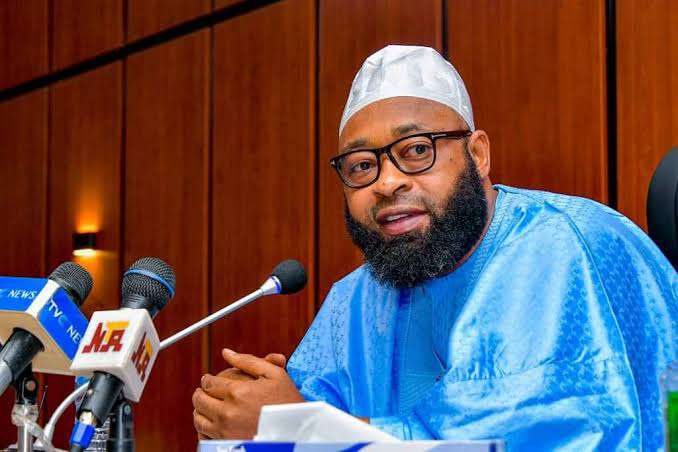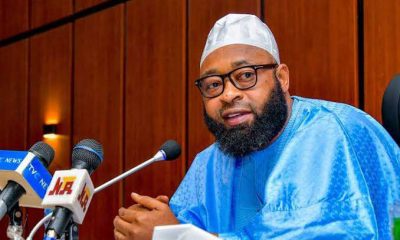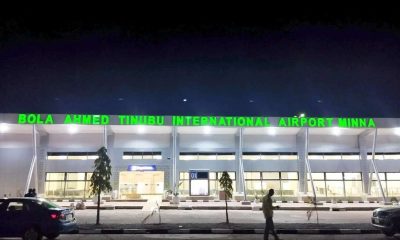Politics
Gov. Bago:A ‘mujahideen’ seeking better society, against democratic rights

Umaru Mohammed Bago is restless and full of zest, but many say for the wrong reasons. For his teeming band of admirers, he’s the ‘Mujahideen’ for good causes, the expected Mahdi sent to rid his state of the ills bedeviling it and exorcise its multifaceted demons. But whether his critics agree with his actions or not, the bottom line is, he can not be ignored.
Of the broth currently exercising the power of emperor in the vast stretches of land of the North, no one has proved more cerebral or controversy-prone than the Nupe man presiding in Niger state as governor.
Bago, apparently, whether by design or default, seems welded to controversies ever since he became governor of the state in 2023.
Two weeks ago, Gov. Bago said it is now mandatory for preachers to submit their sermons for approval. Speaking on TVC’s Politics on Sunday, the governor clarified some aspects of the law seeking to regulate preaching in the state.
“I didn’t ban evangelism… For everyone going to sermon on Friday, he should bring his scriptures for review, and it’s normal. Even in Saudi Arabia, this is done. We cannot say because you have been given the opportunity to be a cleric, you will go out and preach the gospel that is anti-people, anti-government and you think it’s normal.”
His litany of controversies seems immeasurable. It was he who, like a feudal lord, was reported to have banned civil servants from wearing kaftan and babanriga to work except on Fridays. It was within his purview and power as their employer.
He would later say he was quoted “out of context”. Rather than banning the use of kaftan and babanriga, he claimed, his words on the matter were a mere piece of advice to workers he felt would look better and smarter in clothes other than the ones he was alleged to have banned.
We are yet to know how well civil servants in that state have complied with the ban-turned advisory.
In a matter of weeks after the kaftan-babanriga imbroglio, Gov. Bago would be caught again in the news when he placed yet another ban on the mass purchase of food in the state. His order would appear to be an embargo on food exportation to other parts of the country.
But it would soon be clear, as the government explained, that the ban was also to stem the growing tide of food exportation to neighbouring countries whose currencies are better valued than the naira.
Geo-political Food Ban
But when news of the ban was first made public, the impression it created was that it was meant to keep food grown in Niger State within the state while other parts of the country starved. What would be the consequences of that, should the parts of the country, mostly in the South, affected by that order, restrict their own products, goods and services to their parts of the country?
The controversy around the food ban had hardly cleared off when the governor walked straight into another at the Leadership Newspaper Award . There he rose to speak in support of the statement of Peter Obi, the Labour Party presidential candidate in the 2023 election, flaying Nigeria’s importation of grain from war-torn Ukraine.
Bago said Obi, who he called “boss”, was right and added his own bit to the attack right in the presence of other governors of his party.
In the same week, in fact a day after he apparently endorsed Peter Obi’s attack on the Tinubu government, Alhaji Bago was caught on his knees on camera in a handshake with Tinubu in Aso Villa. It all looked like he was in Abuja to make amends for his verbal miscue and some made so much out of this.
More worrisome about Bago was the decision of the Niger State government to rename the only international airport in the state after President Bola Tinubu. The airport, which hitherto, bore the name of an illustrious Northerner and son of Niger State, Abubakar Imam, has been renamed after Tinubu. Why would the governor rename this airport in this manner? Abubakar Imam was a pioneer Northerner in many respects. He was and still is the North’s most famous writer whose writing did much to popularize the Hausa language. So, why would Bago rob Imam to pay Tinubu?
Lifestyle and Family Controversies
Bago, the maverick mujahideen governor is never tired of controversies. Earlier in the year he ordered security agents to clamp down on thugs and those abetting them to disrupt public peace in Minna, the state capital where violence had become a daily occurrence.
His directives, including the arrest of people wearing dreadlocks, followed a series of calls by terrorised residents of Minna to curb the worsening thuggery that has claimed the lives of many innocent people
More than 10 people had reportedly been killed by the thugs this year, including a retired permanent secretary. On 22 April, some thugs allegedly stabbed a bank driver identified as Mohammed, with a scissor causing his death, according to a statement by the spokesperson of the Niger State Police Command, Wasiu Abiodun. The deceased was assisting local vigilantes in arresting thugs, who had assembled around his house.
Immediately after the incident, the Niger State House of Assembly met with heads of security agencies, telling them to find a solution to the scourge. Bago directed that anyone wearing deadlocks should be shaved, arrested and fined.
“We will have zero tolerance for rascality,” said the governor. “Anybody that you find with dreadlocks, arrest, barb the hair and fine him.
“Nobody should carry any kind of haircut inside Minna. I have given marching orders to security agencies,” he added.
At the meeting attended by security agencies and traditional rulers earlier in the year, Bago urged parents to warn their children as the state government will now go hard on those disturbing public peace in Minna.
“Parents should warn their children. From this moment, it’s 100 per cent fire-for-fire,” he warned.
“Also, any house found harbouring criminals should be demolished,” the governor ordered. “Niger State is not for useless people.”
Bago also banned the movement of commercial motorcycles and tricycles from 6 p.m. to 6 a.m. in Minna. He clarified that only those being used for medical emergencies would be exempted.
He also called on local authorities, including district, village, and ward heads, to document residents in their communities. Also, the governor ordered the arrest of any local authorities harboring criminals.
Further, Mr Bago said, “Anyone found in possession of any weapon, including knives and sticks should be treated as an armed robber.”
If such a person were killed, the governor said their parents “must pay for the bullet before releasing the corpse.”
He ordered that “anyone going to seek for bail of thugs from the police station should also be arrested.”
In addition, the governor said a “special court should be established under the supervision of the Chief Judge of Niger State to handle thuggery cases for speedy judgement and subsequent imprisonment.”
“Any vehicle coming into Minna and caught with illicit drugs should be confiscated into government property,” he ordered.
Gag on Press Freedom
The governor’s rising profile in the North is no cheering news to those advocating tolerance of opposing views. The drama over Badeggi FM in Minna, the Niger State capital, in July was not just another bad day in governance — it was a full-blown self-inflicted crisis.
At an expanded APC caucus meeting, some weeks ago, he ordered the closure of the Badeggi FM, a private radio station after it aired an interview with the immediate-past chairman of the Federal Inland Revenue Service (FIRS), Muhammad Nami.
During the program, a few callers dared to suggest that Nami should consider running for the 2027 governorship. For the governor, that was political heresy. In a flash, he told the Commissioner of Police and the Commissioner for Homeland Security to seal the station, revoke its licence, and even “profile” the owner.
The order was never carried out. Why? A mix of legal reality, political caution, and public outrage.
First, the law was never on his side. Only the National Broadcasting Commission (NBC) can revoke a broadcast licence in Nigeria. The NBC didn’t buy his argument, didn’t back his directive, and certainly didn’t find Badeggi FM guilty of any breach.
Second, the blowback came fast. Civil society groups — from Amnesty International to the Nigerian Guild of Editors — called it what it was: an assault on press freedom. The Minister of Information, Mohammed Idris, who sat in that same meeting, publicly stated that the governor’s order had no legal basis.
Third, the politics didn’t add up. Carrying out the order risked turning a local radio station into a national cause célèbre, painting the government as paranoid and allergic to dissent.
So, instead of police tape on Badeggi FM’s gates, we got something else: a governor’s directive hanging awkwardly in the air, unenforced and increasingly embarrassing.
This isn’t happening in a vacuum. It has been a standard pattern under a mujahideen governor. Niger State journalists know the script: detentions, intimidation, and now, threats of closure. From the arrest of Yakubu Mustapha of Peoples Daily to the alleged assault of VOA’s Mustapha Batsari by a commissioner, the playbook has been consistent — punish the messenger.
And while bandits terrorise Niger’s rural communities and insecurity bleeds into daily life of Nigerlites, the state government’s energies are spent picking fights with broadcasters.
Asked if the ban of preaching was out of fear of indoctrination, the governor said, “It’s in that direction. We want to be able to see what they are preaching, hear what they are saying. We are working together with security agencies; the Department of State Services (DSS), the Police, Nigeria Security and Civil Defence Corps (NSCDC) and the military.”
The Director General of the Niger State Religious Affairs, Umar Farooq, had said anyone interested in preaching must obtain a licence, emphasising that preachers had two months to obtain their licences.
“It is true, the State Government has banned preaching. Any preacher who wants to preach must secure a licence between now and the next two months.”
“All they need to do is to visit our office, get, and fill out the form. After which, they will have to face a panel that will screen them before they can start preaching,” Farooq had said.
Reacting to the development, the Chief Imam of the Federal University of Technology, Minna, Bashir Yankuzo, had said, “My opinion is that preaching is a command. The government is not paying anyone for doing the job; people are preaching in order to earn the pleasure of God. So, the government cannot dictate who to preach to and who not to preach.
“But at the same time, if there are people who are going out of their way to cause security threats, using abusive words and so on, then government can have control over that in order to maintain peace and security.”
The secretary of the Christian Association of Nigeria, Niger State chapter, Raphael Opawoye, had said the Christian body was not aware of the ban.
“The Christian Association of Nigeria is not aware of the ban. We shall come up with a statement when we are officially informed,” he had said.
But an Islamic scholar, Uthman Siraja, had described it as an infringement on religious rights.
“The ban on preaching is an infringement of freedom of worship and religion. The best thing for the government to do is to invite and penalise any preacher, who incites the public in the cause of his preaching”.
Politics of Landmass
In the same TVC outing, he made a wild claim that Borgu LGA in his State is bigger than the entire South East of the country. According to him, “I have a local government in Niger State, Borgu which is bigger than the entire South East Nigeria.”
But a closer look at the facts shows that while Borgu with its headquarters in New Bussa, is renowned for its vast expanse land, the claim does not hold up against official figures.
Professor Mohammed Abubakar, a political scientist, said “Bago is positioning himself for a larger role in the future political dispensation. If you look at it now, Bago is the most visible governor from the North, closely followed by Kano and Kaduna State governors. He has primed himself as “A Puritan “who is out to bring order to a dysfunctional society, but he’s doing it in a wrong way.”
This view tallies with the observation of Dr. Onimisi Ayodeji, another political scientist, who told Business Hallmark that “Bago is genuinely concerned about bringing order to his state. He believes indiscipline and illiteracy are behind much of the breakdown of values, but he has read the symptoms wrongly. His greatest challenge is intolerance of alternative viewpoints. Besides, he is made in the mould of El-Rufai as far as stirring controversy is concerned.”
For Ahmadu Saleh, a political commentator, Bago “Is a rising star to watch in the North with his binoculars pointed at some significant role in 2031.
Umar Pategi, a pepper seller at Sango market who hails from Pategi, Niger state, said Bago “is a good man. I like him, the governor is trying to reduce indiscipline. He has been able to bring killings in Minna to an end.
“Those boys were just turning Minna into a violent nightmare but he has stopped it. He supports agriculture and education. He bought JAMB forms for thousand of indigent students, my son benefitted from it.”
In spite of the many controversies around him, many admit that he has done well in many areas like agriculture and education and he’s committed to restoring discipline into public service.
Personal Background
Born in 1974 to a Nupe family, Gov. Umar Bago attended Marafa Primary School, Minna and Federal Government College, Jos. He earned his West Africa School Certificate from the WAEC. He earned a bachelor’s degree in political science at Usman Danfodio University, Sokoto.
Bago has obtained several postgraduate diplomas and master’s degrees, including a postgraduate diploma in management from the Federal University of Technology Minna in 2001, a Master of Business Administration (MBA) in economics at the Ambrose Ali University, Ekpoma, in 2003, and a master’s degree in finance at University of Calabar in 2005. He is also a distinguished alumnus from Cambridge University in the United Kingdom in 2014.
Bago worked with the United Bank for Africa (UBA), First City Monument Bank (FCMB) and Afri-Bank PLC respectively. He served as manager at First City Monument Bank. He officially joined politics in 2007.
He contested for the Speakership position of the House of Representatives of Nigeria coming second to Femi Gbajabiamila in the 9th National Assembly. He stated, “I won’t back down, I just want to correct the mistake of the party leaders by opinion of zonings.”
He chaired the House Committee on Maritime Safety, Education and Administration. In 2016 he advised the management of the Maritime Commission that 83 staff should be relived of their duties. He stated, “That is how touts are employed.”
He won the APC gubernatorial primary elections in Niger state ahead of the 2023 general elections. He became the winner of the gubernatorial election after pulling a total of 469,896 votes to his closest rival Alhaji Isah Liman Kantigi who got 387,476 votes.
Bago is married with children.








